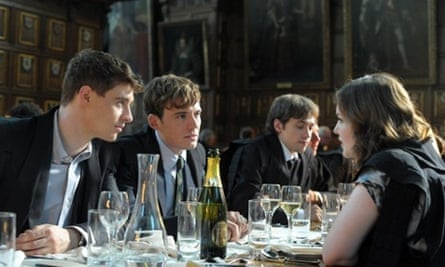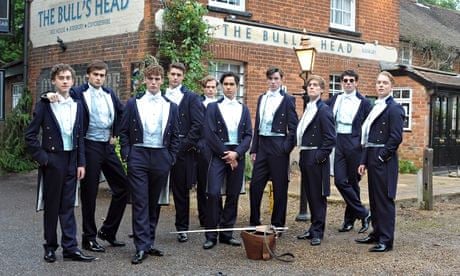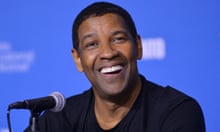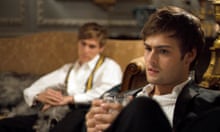Posh, Laura Wade's play inspired by the Bullingdon Club, in which a mob of toffs destined for high office bond over disgust for the poor and a 10-bird roast, was a hit just before the 2010 election. Now, right on cue, here comes the movie version, as next year's campaign begins to heat up, the daggers to glint beneath the TV lights.
Last time round, of course, a powerful piece of Royal Court theatre did not prove sufficient to prevent the election of former club members David Cameron and George Osborne. And the film is, if anything, yet more likely to help secure their return to power. To this extent, it scores an own goal; it comes on dressed as as a cheerleader for the left, then can't help but defect.
Yet though such a result may queer Wade's original pitch, it's great news for the viewer. Conflicting our sympathies serves the work well. Both play and film button-push, but the substantial changes made in the transfer soften the grotesque and muddy the waters.
We start with a prologue in the 17th century, explaining the club's origins (basically: libertine student stabbed by woman's jealous husband, so chums establish hedonistic society in his name). The logic of visualising what was just a snappy anecdote in the play is clear; the wisdom isn't. It all looks a bit Plunkett & Macleane. Plus it kicks things off on a sympathetic note: these chaps may be feckless, but they're men of feeling as well as fun. You might not take them home to meet your mother, but your dodgy brother would really like them.
Flash forward to contemporary Oxford, where the club is looking to recruit a couple of new members: good egg Miles (Max Irons) and bad seed Alistair (Sam Claflin), who cross swords in a tutorial after Miles suggests that the welfare state has its merits. Initiation ceremonies are held – general knowledge, urine cocktail – and we're introduced to other club members including Harry (Douglas Booth), who likes prostitutes and fencing, James (Freddie Fox), set for a career in finance, and Hugo (Sam Reid), a louche postgrad with his eye on Miles. It's not until the two-thirds mark that we get to the supper which makes up most of the play: a debauched multi-courser in the private dining room of a rural pub.

The other invention to pad things out and sex them up is Lauren (Holliday Granger), a hard-graft Huddersfield lass with whom Miles begins a relationship. Though the attraction could feel crass – they do spend ages comparing words for "toilet" – it's nicely played, smart on how a difference that once felt exotic can lose its frisson.
So: a stagey satire becomes a class-gap romance, an inverted Brideshead (Max is Jeremy Irons's son; Waugh looms large in text and setting), with some larky period colour. The play's more parochial exchanges have been filleted out and the scope opened for global consumption. It's not claustrophobic, as the play purposefully was, but dreamy of spire and airy of visuals.
Ultimately, though, it's the very act of granting the play the big-screen treatment which most muzzles Posh's bite. Stick anyone pretty in close-up, and chances are you'll root for them. Film sells itself on empathy – on stars whose faces are familiar, who come with a fan base. Even the Riot Club's rallying cry – "do nothing without joy and everything to excess" – is catnip to cinema, which prefers a carpe diem slogan to one preaching moderation.

Acceptance to Oxford, says Miles, is "like being invited to 100 parties all at once". The Riot Club hands its audience a ticket, as well as a free pass to pour scorn over proceedings. That's a double-bill which should prove pretty irresistible.











Comments (…)
Sign in or create your Guardian account to join the discussion